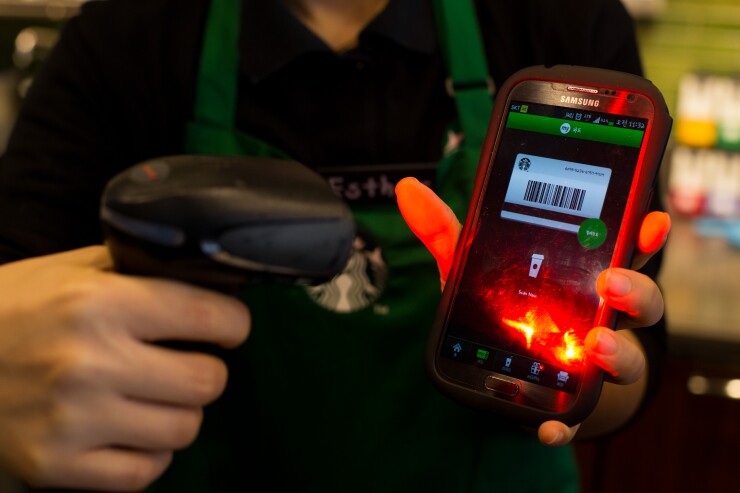Developing mobile apps as an alternative to cash is one thing. Telling people they can't use cash is another.
While Starbucks is making a tentative move into cash refusal at one location, it's unlikely any retailer would widely refuse cash payments in the near term.
"Barring government mandate, which won’t happen, the move away from cash has to be a demographic as much as an economic decision," said Thad Peterson, a senior analyst at Aite Group. "In many areas cash is an essential component of commerce because not everyone possesses a credit or a debit card."

If there is a retailer that could successfully pull off a cashless store, it would be Starbucks, which serves a mobile-friendly demographic from a Seattle headquarters that aids its tech-savvy brand.
More than a quarter of the chain's transactions come through its
"The Starbucks case is interesting. It has built a loyalty app, meaning there was already an incentive to move away from cash," said Gareth Lodge, a senior analyst at Celent.
Starbucks did not return a request for comment by deadline, though it told
It's also unclear what Starbucks expects to learn from the test at a high-profile venue, suggesting the move is more of a publicity stunt. The downtown Seattle location serves a mostly upscale clientele that probably doesn’t use much cash already, so there is little risk of a consumer outcry.
"Starbucks is a somewhat upscale [chain], especially at the location they are testing," said Tim Sloane, vice president of payments innovation and the director of the emerging technologies advisory service at Mercator. "Bringing this solution into low or moderate income neighborhoods would almost certainly delivery different results than those experienced in downtown Seattle."
This also affects how transferrable the concept is to other businesses. Starbucks' mobile app has given it a huge amount of customer data that informs marketing campaigns and personalized offers, but the app's success is built on top of on an already popular gift card program. Any other company wouldn't see the same results by copying the mobile strategy alone.
But Starbucks and Shake Shack see a clear value to mandating the use of mobile apps or cards. By removing cash as an option, the
"I doubt many other QSRs can take this approach, except in store locations similar to the [Starbucks downtown location]," Sloane said.
Starbucks must be mindful of the cost differences of the noncash payment options it accepts, Sloane said.
"If Starbucks can move consumers into prepaid or mobile phones to pay, instead of credit cards, they will have made a profitable move," Sloane said. "If this approach increases the use of traditional debit and credit cards, then it is likely Starbucks will lose some margin due to an increase in interchange."
A more dramatic move away from cash in the U.S. would likely require a group of merchants acting together, preferably in the same business category, according to Lodge. In other cases, a government mandate similar to
"The journey toward having a cashless society is not easy," said Zil Bareisis, a senior analyst at Celent "Some countries are further ahead than others, but overall cash has proven to be a resilient payment method."





